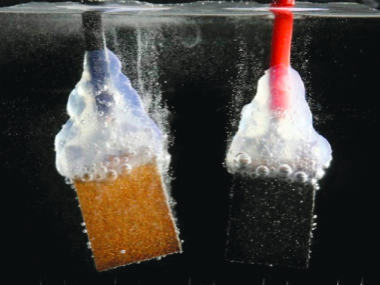
HOUSTON (TIP): University of Houston physicists have found a new way of splitting water into hydrogen and oxygen, which could be an effective method of producing an abundance of clean hydrogen fuel in the future. This discovery would solve one of the primary hurdles of using water to produce hydrogen, the university release said.
“Hydrogen is the cleanest primary energy source we have on Earth. Water could be the most abundant source of hydrogen if one could separate the hydrogen from its strong bond with oxygen in the water by using a catalyst.
To split water into hydrogen and oxygen, two reactions are needed – one for each element,” Paul C W Chu, one of the team members, said. The main issue has been getting an efficient catalyst for the oxygen part of the equation, which is what these researchers say they have now cracked.
The catalyst is made up of a ferrous metaphosphate and a conductive nickel foam platform, a combination of materials the team said is more efficient and less expensive than existing solutions.
It also shows impressive durability in tests, operating for more than 20 hours and 10,000 cycles without a hitch. Using the new method means hydrogen can be produced without creating waste carbon. That is something that he existing production methods, like steam methane reforming and coal gasification, cannot avoid.
Until now, oxygen reactions have often relied on electro catalysts that use iridium, platinum, or ruthenium – ‘noble’ metals that are difficult and expensive to source.
Experts say oxygen reactions have become a bottleneck to the whole process. Nickel, in contrast, is more abundant, easier and cheaper to get. The metal forms the basis of another water splitting method discovered last year, so scientists now have several avenues to explore for improving hydrogen production. The actual splitting itself is usually powered by an electric current or solar power, but because water only captures a small portion of the light spectrum, it is more productive to convert sunshine into energy first, then use the electricity to release hydrogen.
If scientists can crack the formula, hydrogen could eventually power everything from homes to cars. And it is a far better option for the environment than CO2 – gushing fossil fuels – hydrogen fuel produces water as a byproduct of combustion, which is both sustainable and non-polluting.
And the good news is, should the water electrolysis route not work out, researchers are also exploring ways to get hydrogen from biomass.
The less heat and the less energy we use in preparing the hydrogen in the first place, the better it is for our planet – and once we have it ready, it is far cleaner and greener than fossil fuels.
“We believe our finding is a giant step towards practical and economic production of hydrogen by water splitting, which will significantly contribute to the effort to reduce the consumption of fossil fuels,” the Houston researchers said.
Source: PTI





Be the first to comment